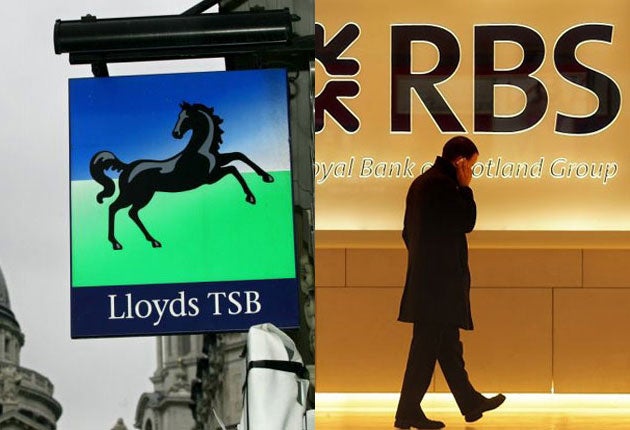£1,000 paper loss per household for bank bailouts

Every household in the country is sitting on paper losses of almost £1,000 so far on bailouts for Royal Bank of Scotland and Lloyds Banking Group, it was disclosed today.
UK Financial Investments Limited (UKFI), which manages public stakes in the two banks, said every household had more than £3,000 invested in Lloyds and RBS shares.
But the £34.5 billion currently invested had shrunk to £23.6 billion as of June 30 - a 32 per cent paper loss of £10.9 billion, equivalent to about £950 per household.
The taxpayer is still deeply in the red despite a relative recovery in bank stocks in recent months. In February the shares were showing losses of £18.1 billion.
The figures came as UKFI published its first annual report and strategy for selling the public stakes in the ailing banks - although it warned an exit could take several years.
The taxpayer currently owns 70 per cent of RBS and 43 per cent of Lloyds, but after extra shares are issued under a scheme to insure the banks' toxic debts, this will rise to 84 per cent and 62 per cent respectively.
Acting UKFI chairman Glen Moreno said: "Make no mistake - this ain't over yet. We are a long way away from normalcy in the world's financial markets."
Mr Moreno said the body's aim was to achieve "sound, prudent and profitable banks", and added: "UKFI is not, I repeat not, a short-term investor."
Chief executive John Kingman, the senior Treasury official who led negotiations with the banks over the rescue, said the public "rightly expected" to get their money back.
Mr Kingman said he could not "sensibly answer" questions over when the stakes would be sold, although the body was not "currently working" on any transactions.
He said that moves to sell too early would mean a poorer deal for taxpayers, adding: "This will not and cannot be a short term game."
UKFI will consider sales to major institutional investors - which can be organised quickly - and sales to private shareholders, as well as selling bonds which can be transferred into shares in the two banks at a later date.
But the annual report adds: "While there have been some encouraging signs recently, it is in our view too early to make a judgment that the conditions are right for a share sale."
The report estimates that when additional shares relating to the asset protection scheme - the taxpayer-backed insurance scheme for the toxic debts of both banks - are included, the value of the investments UKFI manages will rise to £60 billion at current prices.
It warned "we may need to undertake several transactions in each bank's shares over a period of years to complete our exit".
But an upturn in investor demand and a return to health for the banking sector and economy as a whole "could create selling opportunities", it said.
"Sales under these circumstances seem likely to be consistent with our objectives of delivering value to the taxpayer and of maintaining financial stability," it added.
UKFI, which came under fire for approving RBS boss Stephen Hester's potential £9.6 million pay package, said it had implemented "perhaps the most far-reaching reforms to remuneration structures of any large banks in the world".
Mr Hester, whose pay deal included a £1.2 million basic salary, has said he will defer part of his payment for a further two years after concerns were raised by investors.
Join our commenting forum
Join thought-provoking conversations, follow other Independent readers and see their replies
Comments
Bookmark popover
Removed from bookmarks